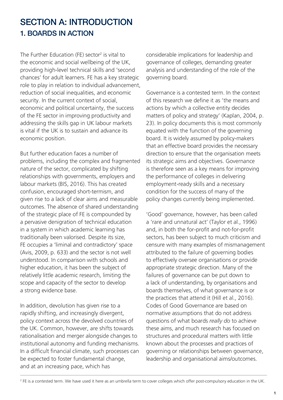
The Further Education (FE) sector2 is vital to
the economic and social wellbeing of the UK,
providing high-level technical skills and 'second
chances' for adult learners. FE has a key strategic
role to play in relation to individual advancement,
reduction of social inequalities, and economic
security. In the current context of social,
economic and political uncertainty, the success
of the FE sector in improving productivity and
addressing the skills gap in UK labour markets
is vital if the UK is to sustain and advance its
economic position.
But further education faces a number of
problems, including the complex and fragmented
nature of the sector, complicated by shifting
relationships with governments, employers and
labour markets (BIS, 2016). This has created
confusion, encouraged short-termism, and
given rise to a lack of clear aims and measurable
outcomes. The absence of shared understanding
of the strategic place of FE is compounded by
a pervasive denigration of technical education
in a system in which academic learning has
traditionally been valorised. Despite its size,
FE occupies a 'liminal and contradictory' space
(Avis, 2009, p. 633) and the sector is not well
understood. In comparison with schools and
higher education, it has been the subject of
relatively little academic research, limiting the
scope and capacity of the sector to develop
a strong evidence base.
In addition, devolution has given rise to a
rapidly shifting, and increasingly divergent,
policy context across the devolved countries of
the UK. Common, however, are shifts towards
rationalisation and merger alongside changes to
institutional autonomy and funding mechanisms.
In a difficult financial climate, such processes can
be expected to foster fundamental change,
and at an increasing pace, which has
considerable implications for leadership and
governance of colleges, demanding greater
analysis and understanding of the role of the
governing board.
Governance is a contested term. In the context
of this research we define it as 'the means and
actions by which a collective entity decides
matters of policy and strategy' (Kaplan, 2004, p.
23). In policy documents this is most commonly
equated with the function of the governing
board. It is widely assumed by policy-makers
that an effective board provides the necessary
direction to ensure that the organisation meets
its strategic aims and objectives. Governance
is therefore seen as a key means for improving
the performance of colleges in delivering
employment-ready skills and a necessary
condition for the success of many of the
policy changes currently being implemented.
'Good' governance, however, has been called
a 'rare and unnatural act' (Taylor et al., 1996)
and, in both the for-profit and not-for-profit
sectors, has been subject to much criticism and
censure with many examples of mismanagement
attributed to the failure of governing bodies
to effectively oversee organisations or provide
appropriate strategic direction. Many of the
failures of governance can be put down to
a lack of understanding, by organisations and
boards themselves, of what governance is or
the practices that attend it (Hill et al., 2016).
Codes of Good Governance are based on
normative assumptions that do not address
questions of what boards really do to achieve
these aims, and much research has focused on
structures and procedural matters with little
known about the processes and practices of
governing or relationships between governance,
leadership and organisational aims/outcomes.
2 FE is a contested term. We have used it here as an umbrella term to cover colleges which offer post-compulsory education in the UK.
1
SECTION A: INTRODUCTION
1. BOARDS IN ACTION